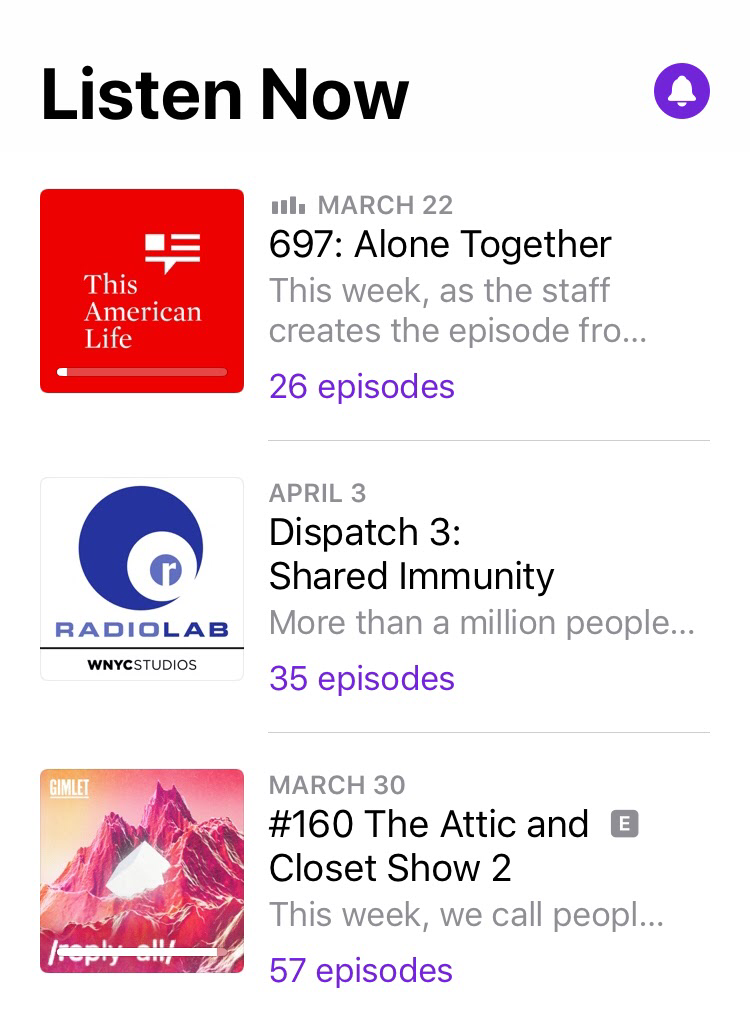
Ever heard of Serial? This American Life? Radiolab? If you’re one of the 16 million Americans that deem themselves “avid podcast listeners,” it’s likely you have. Podcasts are unique in that they can be listened to anywhere, anytime, and the listener can choose exactly what type of podcast fits their mood. What if the radio is only airing a gloomy story about the state of the world, but you want something uplifting filled with silly anecdotes? Look no further than the podcast app on your phone. A podcast could be considered internet radio on-demand, with close to a million podcasts currently being produced as of March 2020. There are endless possibilities to fit anyone’s demand. In this bizarre time of social-distancing and self-quarantining, podcasts are still being produced, albeit remotely from the safety of many homes and apartments.
At the end of episode 696 of the podcast This American Life, “Low Hum of Menace,” host Ira Glass explains that he will be working from home for the next few weeks, quarantined due to possible exposure to COVID-19, saying “We’ll be shutting down our office; most everybody in our office was already working from home. Between now and the next time I talk to you, stay well and wash your hands.” For most businesses, an office shutdown would be devastating. For podcasts, production is still possible thanks to modern technology giving us the ability to continue putting content out with little issue. The next week, This American Life came out with another episode, despite their host being totally isolated from the crew. Another great example of podcasts continuing through this crisis is podcast network Gimlet Media’s Reply All.
Reply All is a podcast that focuses on how the internet shapes us, and how we shape the internet, hosted by PJ Vogt and Alex Goldman. Co-host PJ Vogt says in the episode “The Attic and Closet Show,” “back in the early days of Gimlet, all of our episodes were recorded in this tiny little studio that we got off Craigslist. Just picture a phone booth, a slightly larger than average phone booth.” Vogt says that he kept the little recording studio, just in case. “That is where I am talking to you from today, and for the foreseeable future. In my apartment, in a closet, in a smaller room in that closet.” Podcasts can be made anywhere, which is something that is vital in times like these, or any point when information needs to be provided on short notice. Vogt says, “This week we were not scheduled to have an episode, but we wanted to be here so we’re here.” Alex Goldman provides a little insight on why it is so rewarding to produce a podcast, saying, “we’re a small team, I love everyone I work with, it’s a lot of fun, and my only limit on what stories I can produce is my imagination and my willingness to try new stuff.” The simplicity and spontaneity that the platform provides creators is rare in the world of audio entertainment. As the weeks of quarantine roll by, podcast creators are able to continue with content (both lighthearted and serious) to appease listeners.
Janet Webster, student at Sarah Lawrence and finalist in KCRW’s 2019 Radio Race, elaborates on how podcasts are different and more accessible than radio. “Podcasts have less regulation. More people can make them, they can say whatever they want (or what they want within the rules and regulation of their host platform instead of the FCC),” says Webster. “They can edit them, and the listeners can control when and how they listen.”
If you’re looking for more informational media, with updates and speculations on the COVID-19 pandemic, Radiolab has been continuing to produce a series of episodes titled “Dispatch.” The Radiolab team dives deeper into questions surrounding the onslaught of numbers we take in every day, cures, and immunity. The miniature series puts the waves of information into a nice digestible bundle. If you’re looking for something to keep your mind off of the flood of virus-related information, try lighthearted podcast Comedy Bang! Bang! or talk show host Conan O’Brien’s podcast Conan O’Brien Needs a Friend. For something to remind you that the world will continue creating after we emerge from our homes in the coming months, listen to 99% Invisible where host Roman Mars talks design and architecture, or How I Built This, where host Guy Raz tells the stories behind some of the world’s most well-known companies or products. Podcasts will stay strong in the coming months as most other forms of media come to a halt.
































